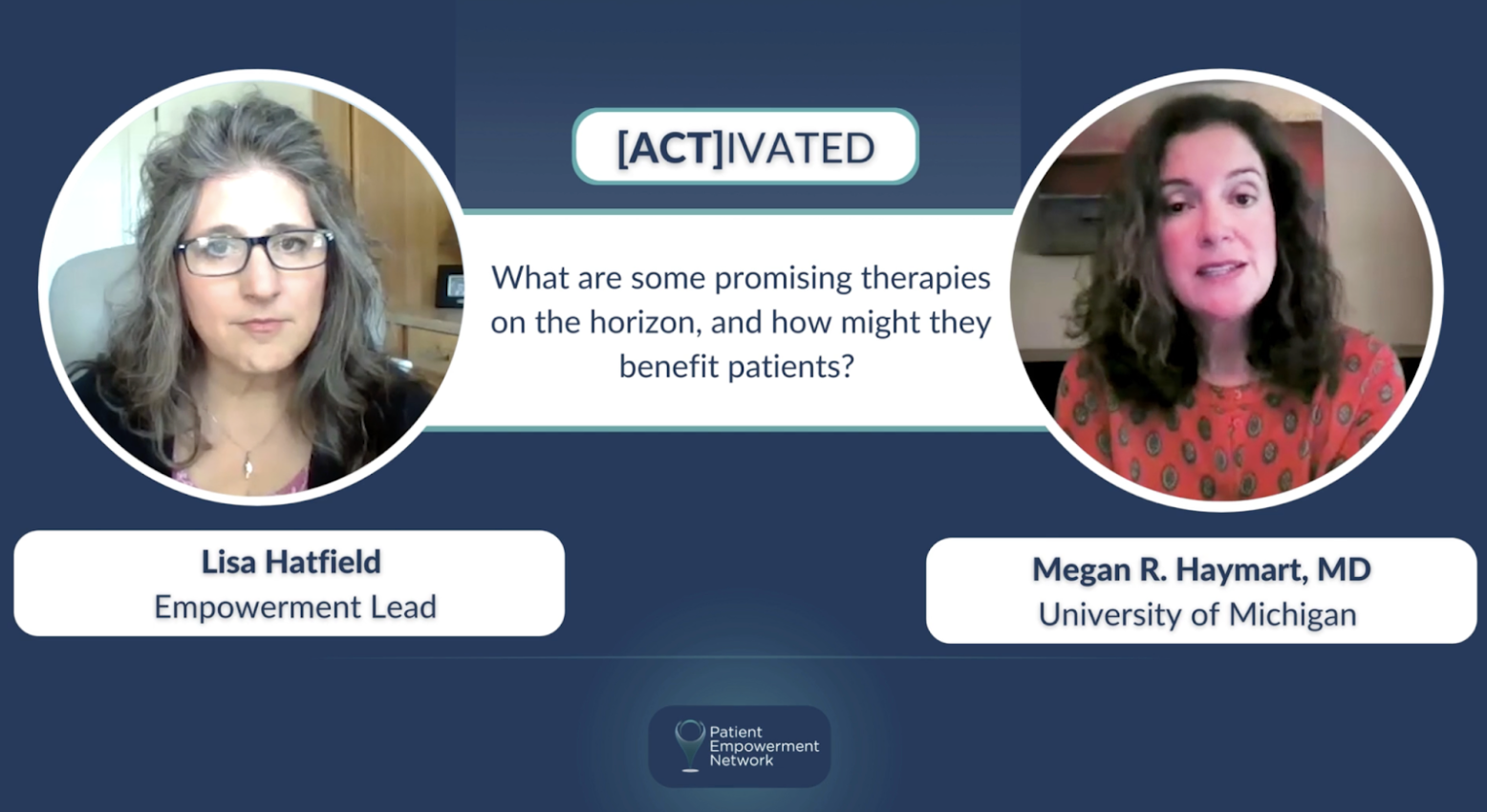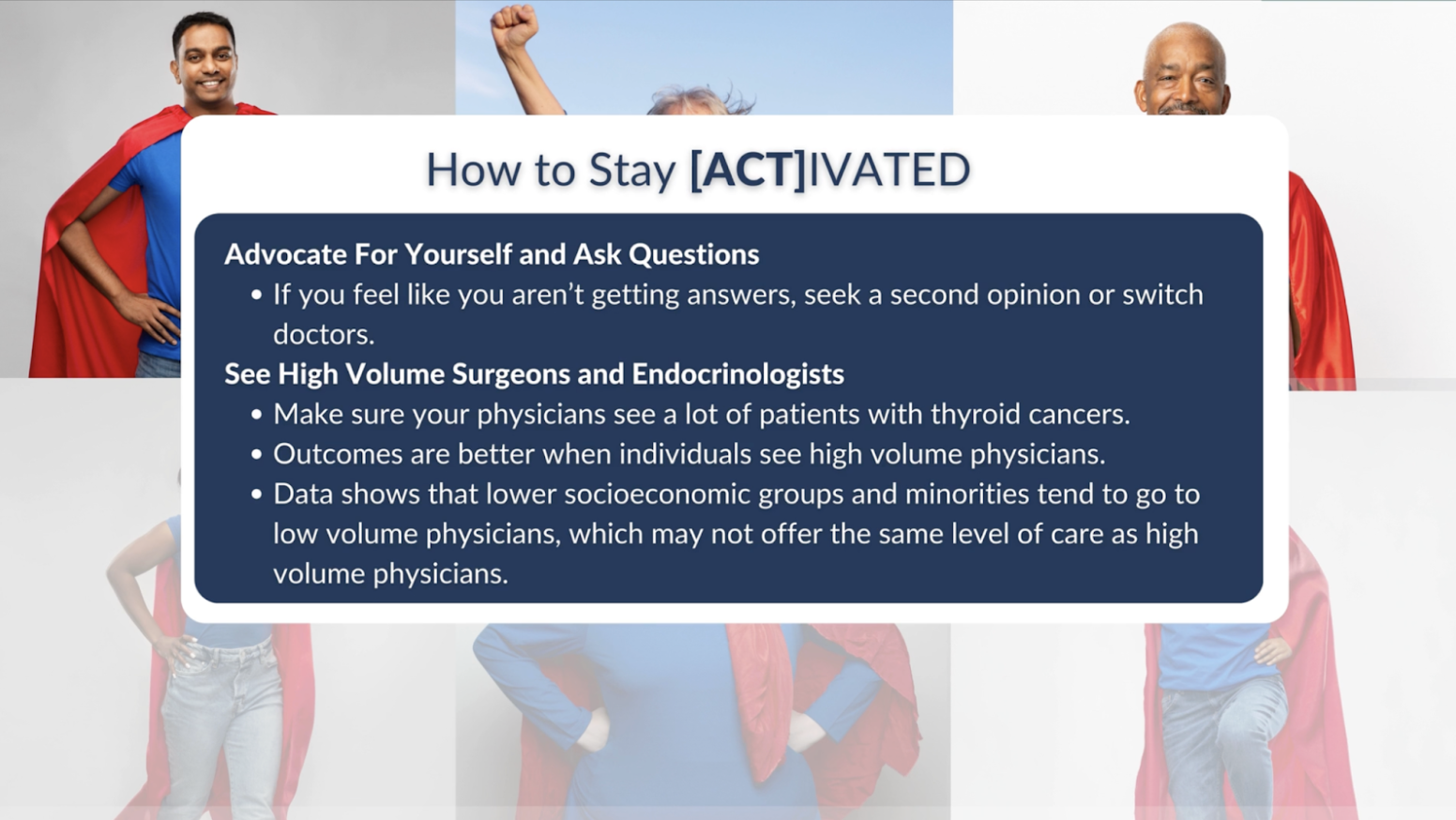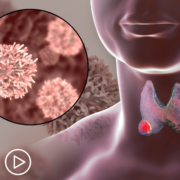Understanding Targeted Thyroid Cancer Treatment Approaches from Patient Empowerment Network on Vimeo.
What are targeted thyroid cancer treatment approaches? Dr. Wirth explains standard options like multikinase inhibitors, newer gene-specific treatments, patient suitability for targeted therapies, and common side effects.
Dr. Lori Wirth is the Medical Director of the Center for Head and Neck Cancers at Massachusetts General Hospital. Learn more about Dr. Wirth.
See More from Evolve Thyroid Cancer
Related Resources:
Transcript:
Katherine:
Thank you. Dr. Wirth, what are the targeted treatment approaches for treating thyroid cancer?
Dr. Wirth:
Yes, so we do have new options for treating iodine-refractory thyroid cancer, also anaplastic thyroid cancer, and then the medullary thyroid cancer.
So, the first group of drugs that were studied starting a decade ago and have become standard of care options for these patients are the multikinase inhibitors, which are targeted therapies. But the drugs target multiple kinases not just one kinase, so we call them multikinase inhibitors. Lenvatinib (Lenvima) is the multikinase inhibitor that’s used most often in iodine refractory thyroid cancer.
But we have other multikinase inhibitors as well. Cabozantinib (Cabometyx) is a drug that’s available now for second-line therapy in iodine refractory thyroid cancer. That’s a multikinase inhibitor. And then for medullary thyroid cancer multikinase inhibitors were studied about 10 years ago as well.
And cabozantinib (Cabometyx) and vandetanib (Caprelsa) are both multikinase inhibitors that have good activity and were FDA-approved for the treatments of medullary thyroid cancer. But one of the things that’s been so exciting in the last five to eight years is that we now know that a large portion of all of these various thyroid cancers are driven by specific gene mutations.
And many of those gene mutations lead to expression of abnormal proteins that make the cancer a cancer cell. And in many circumstances, those abnormal proteins driving the cancer cell growth are now targetable with gene-specific therapies. So, there’s been a lot of progress made recently in that area of the work that we do, which has really led to some great successes.
So, the first example of a really great success was in targeting the TRK protein, TRK. And that is aberrantly expressed in a subset of the iodine refractory differentiated thyroid cancers by virtue of a gene alteration called a fusion. So, you can see NTRK1 or NTRK 3 fusions driving a subset of iodine refractory differentiated thyroid cancer.
And there are now a couple of drugs that target TRK very potently and specifically including larotrectinib (Vitrakvi) that was studied in multiple different types of tumors all driven by NTRK fusions, including a fairly large cohort of patients with iodine refractory differentiated thyroid cancer. And in the thyroid cancer patients, we saw really high responses with larotrectinib, which is an oral drug taken by mouth at home every day.
And not only did we see very high response rates, but we also are seeing very durable responses where patients can remain on larotrectinib month after month after month or even for years with a significant regression of their thyroid cancer. Sometimes people even will have a complete response on larotrectinib. And they can tolerate larotrectinib well for the most part for a very long period of time. So, that’s a targeted therapy success story for patients with NTRK fusion-positive thyroid cancer. Another example is targeting RET fusions and RET mutations. So, we see RET fusions in iodine refractory differentiated thyroid cancer in a portion of them.
We also occasionally see RET fusions driving anaplastic thyroid cancer. And then more than half of patients with medullary thyroid cancers will have RET mutations. And so, the gene mutation is slightly different than a gene fusion, but the end result is very similar so that RET is overactive in these cancers and now is druggable with RET-specific inhibitors. The one that’s been studied the most in thyroid cancer is selpercatinib (Retevmo). And similar to larotrectinib and NTRK driven thyroid cancers serlpercatinib and RET-driven thyroid cancers has great activity, very high response rates, very durable responses. And again, it’s taken at home every day by mouth, and it’s really very well-tolerated overall.
Katherine:
Well which patients are a good fit for a targeted treatment approach?
Dr. Wirth:
So, the patients that are a good fit are patients first of all who need a systemic therapy.
So, for example, if a patient has had a thyroid nodule that’s not all that big, a biopsy shows it’s thyroid cancer, and the patient has a complete resection of that disease and may or may not have gotten treated with radioactive iodine.
But if they’re disease free they don’t need any further therapy. And a lot of patients are in that category which is the best-case scenario. But when patients have persistent disease that eventually is going to grow over time, then we do genotyping of the tumor or molecular diagnostics. It’s the same thing, different phrases. But then we’ll extract the DNA from the cancer cells to see what types of targetable gene alterations might be present driving that thyroid cancer. In patients who are found to have an NTRK fusion, a drug like larotrectinib is an option.
If we see a RET fusion, then a RET specific therapy might be an option. So, you need to have some disease that needs a systemic therapy, and then the target needs to be present as well.
Katherine:
What are the common side effects for a targeted approach?
Dr. Wirth:
So, the side effects are a little bit different flavor for the different drugs. So, larotrectinib, for example, is a potent and specific TRK inhibitor. And TRK is expressed in the development of the nervous system as well as the maintenance in full grown people of the nervous system. So, you can have on target TRK related side effects involving the nervous system from when patients are on larotrectinib.
So, we can, for example, see a little bit of dizziness or gait unsteadiness which is a direct result of inhibiting TRK. Or sometimes patients will develop kind of an unusual pain syndrome where when they’re getting close to the time that they’re supposed to take their next does of Larotrectinib when the amount of drug in the body is beginning to wane, then some patients will develop pain like joint pain for example, pain from arthritis but it seems to be exacerbated.
And then when they take their next dose of larotrectinib the pain goes away as well. So, there’s some impact on pain control that we can see as a side effect of larotrectinib. Fatigue I think is the other probably most common side effect which probably also is an on-target side effect from larotrectinib.
Katherine:
Yeah.
Dr. Wirth:
There can be some inflammation in the liver which we can see in blood tests, so we have to monitor blood tests for that kind of inflammation, which is uncommon but can be seen and sometimes will require some dose reductions in order to not have to worry about liver injury in a particular patient.



















